Theories of Practice and Practice of Theories
Course website: www.placemakingandperformance.wordpress.com
COURSE BLOG: www.placemakingandperformance.wordpress.com/blog/
 Clockwise from top left, 1st, 4th and 5th images courtesy of Pak Han
Clockwise from top left, 1st, 4th and 5th images courtesy of Pak Han
Spring 2015
Landscape Architecture 254 / Theater, Dance, and Performance Studies 266
CCN: 88457
4 units
Instructors: Ghigo DiTommaso (Landscape Architecture and Environmental Planning) and Erika Chong Shuch (Theater, Dance, and Performance Studies)
Thursdays 5:30-8:30pm
315D Wurster Hall
WHAT:
In this course, we will both investigate and intervene in the urban public realm. We will explore the contested normative frameworks that make up our notion of public space by examining the corpus of descriptive and prescriptive theories on the subject. We will test some of the central hypotheses that support such theories through student-led urban actions, involving impromptu performances and tactical placemaking.
In the first part of the class (Theory of Practice), we will conduct a critical review of an extensive selection of theoretical writings and work collaboratively on formulating a shared definition of the urban res publica.
In the second part of the class (Practice of Theory), we will try to measure the distance between our aspirations for public space and the reality of our urban surroundings by conceiving and staging a series of extemporaneous interventions across various Bay Area sites. The reactions we provoke may bring unspoken truths about our public realm to light and offer clues for future action for change.
WHO:
Graduate students from all departments are encouraged to register. No previous experience in design or performance is necessary. This experimental course is part of the interdisciplinary Global Urban Humanities Initiative (GloUH), a joint venture of the College of Environmental Design and the Arts & Humanities Division of the College of Letters & Science. GloUH aims to deepen our knowledge of cities by using approaches from architecture, urban planning, and landscape architecture as well as from art, literature, music, and other humanistic disciplines.
EXPECTATIONS:
You will be expected to read and write about theory, to make things, and to move your body in space. This does not mean you need to be fluent in critical theory, a carpenter, or a dancer. Students will bring strengths and questions from their respective disciplines and learn from each other. You will be outside your comfort zone at times, but in a supportive and collaborative environment.
INSTRUCTORS:
Ghigo DiTommaso is a lecturer in the Department of Landscape Architecture and Environmental Planning. Trained as an Architect and an Urban Designer in Florence, Ghigo sharpened the tools of the trade in Barcelona, where he practiced the profession, conducted academic research, and taught for several years before sailing west to become a core member of the Rebar Art & Design Studio in 2012. Since 2014 he has been part of Gehl Studio. At the College of Environmental Design, besides teaching, Ghigo also coordinates the Adaptive Metropolis Alliance and leads a new undergraduate summer program focusing on Urban Innovation called Disc. Ghigo holds a PhD and a MScArch from EtsaB, Barcelona School of Architecture, and a M.Arch and a B.Arch from the Università di Firenze.
Erika Chong Shuch is a lecturer in the Department of Theater, Dance, and Performance Studies, where she has also been an artist in residence. A choreographer, director, and performer as well as a teacher, she is the artistic director of the Erika Chong Shuch Performance Project, a group of artists and galvanizers who create and present original performance work. Valuing vulnerability and humor, the company’s ruminations coalesce into imagistic assemblages of music, movement, text, and scenic design. Shuch has a BA in Theater Arts with an emphasis in Dance from UC Santa Cruz and an MFA in Creative Inquiry from the New College of California.
MORE INFORMATION:
Please visit the Global Urban Humanities website for more information on the initiative. For questions about the course, please contact gditommaso@berkeley.edu and erika@erikachongshuch.org.
